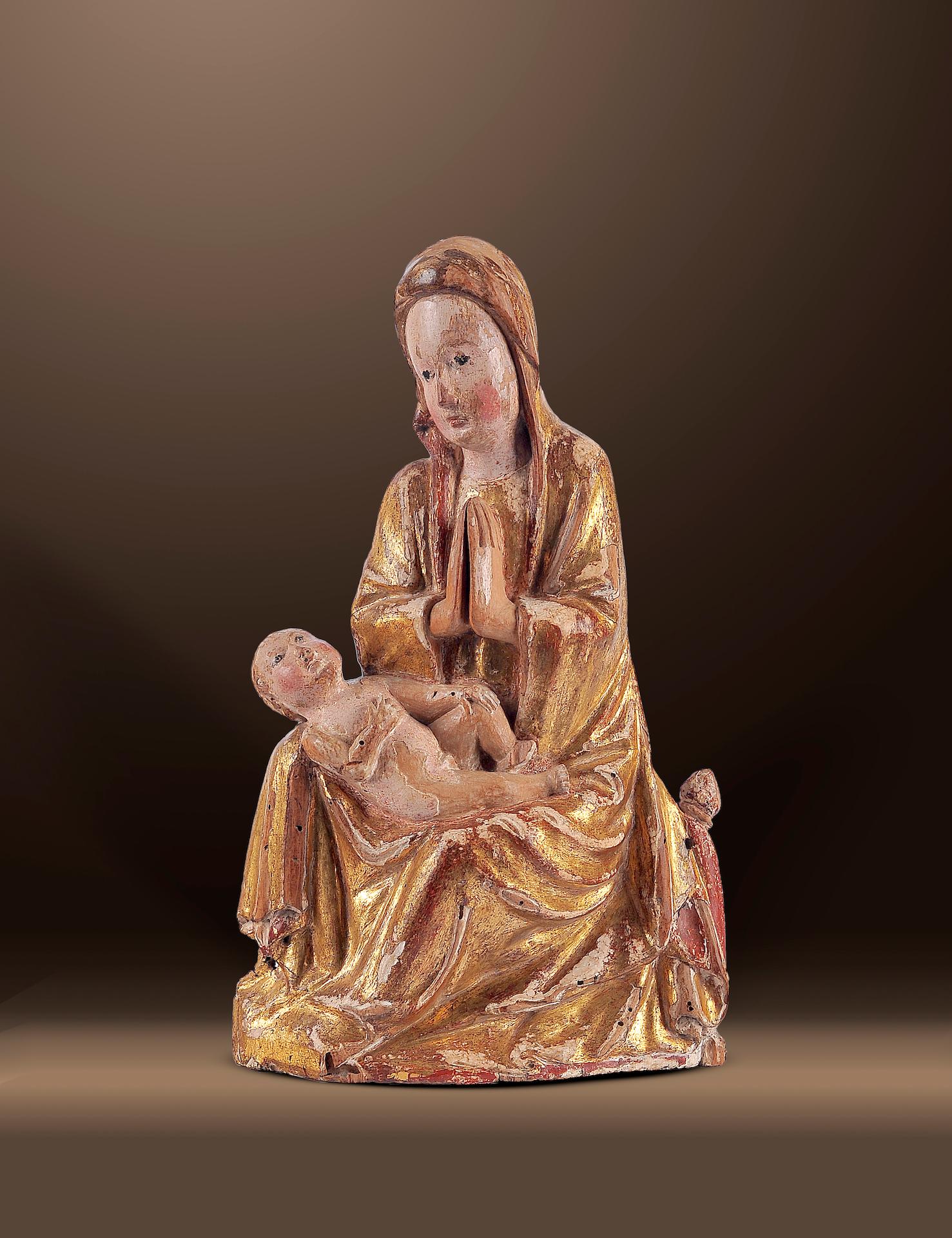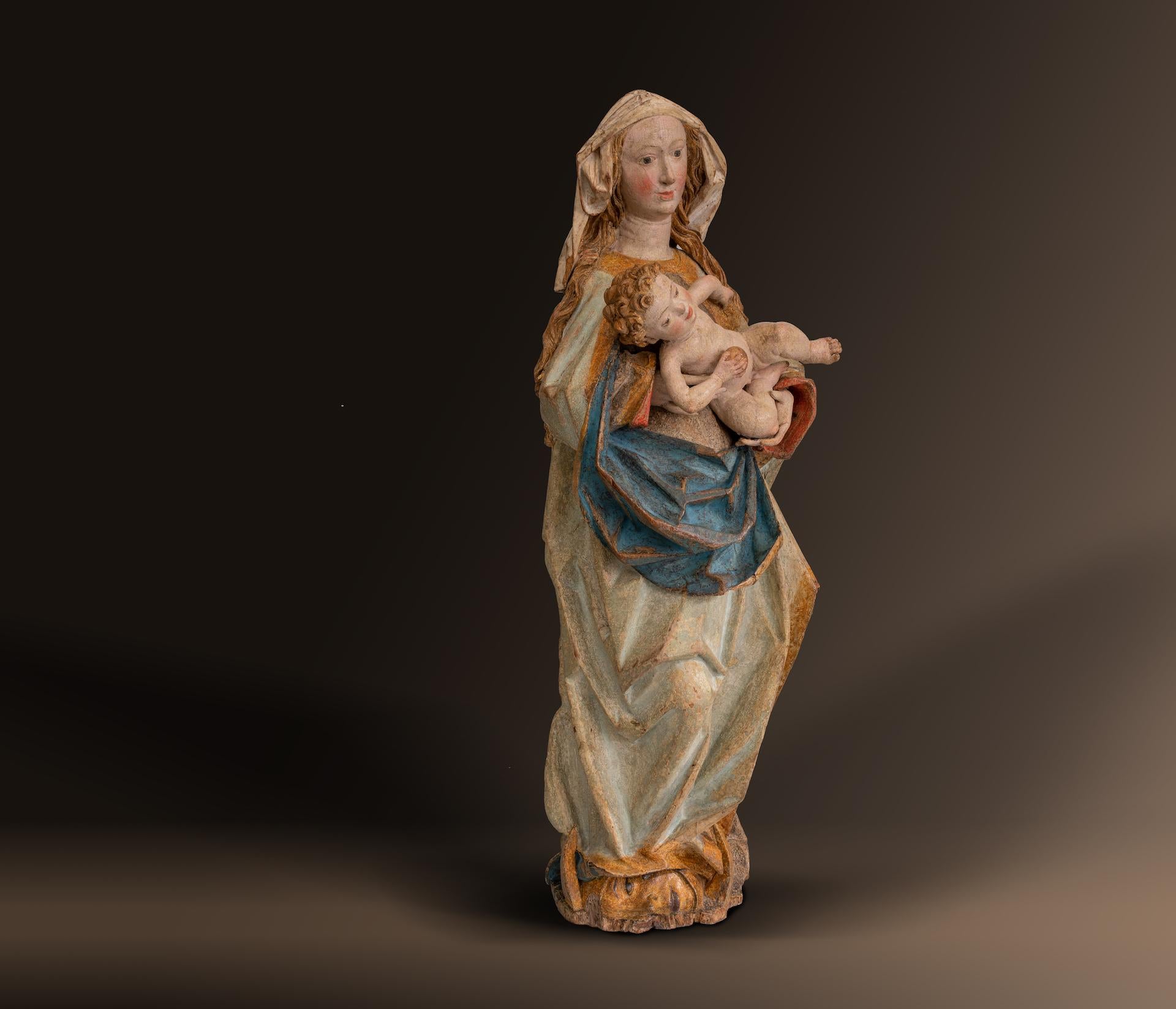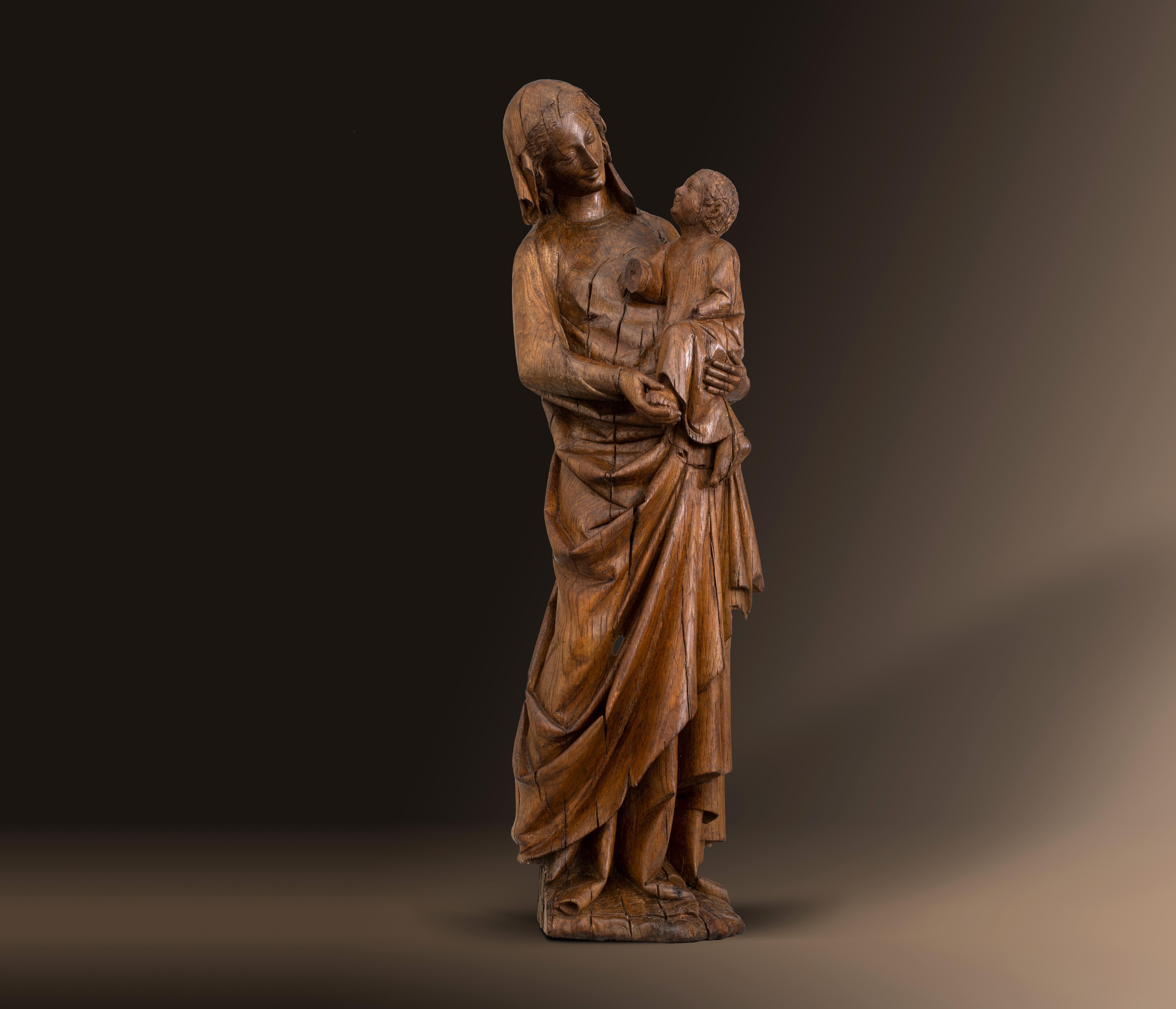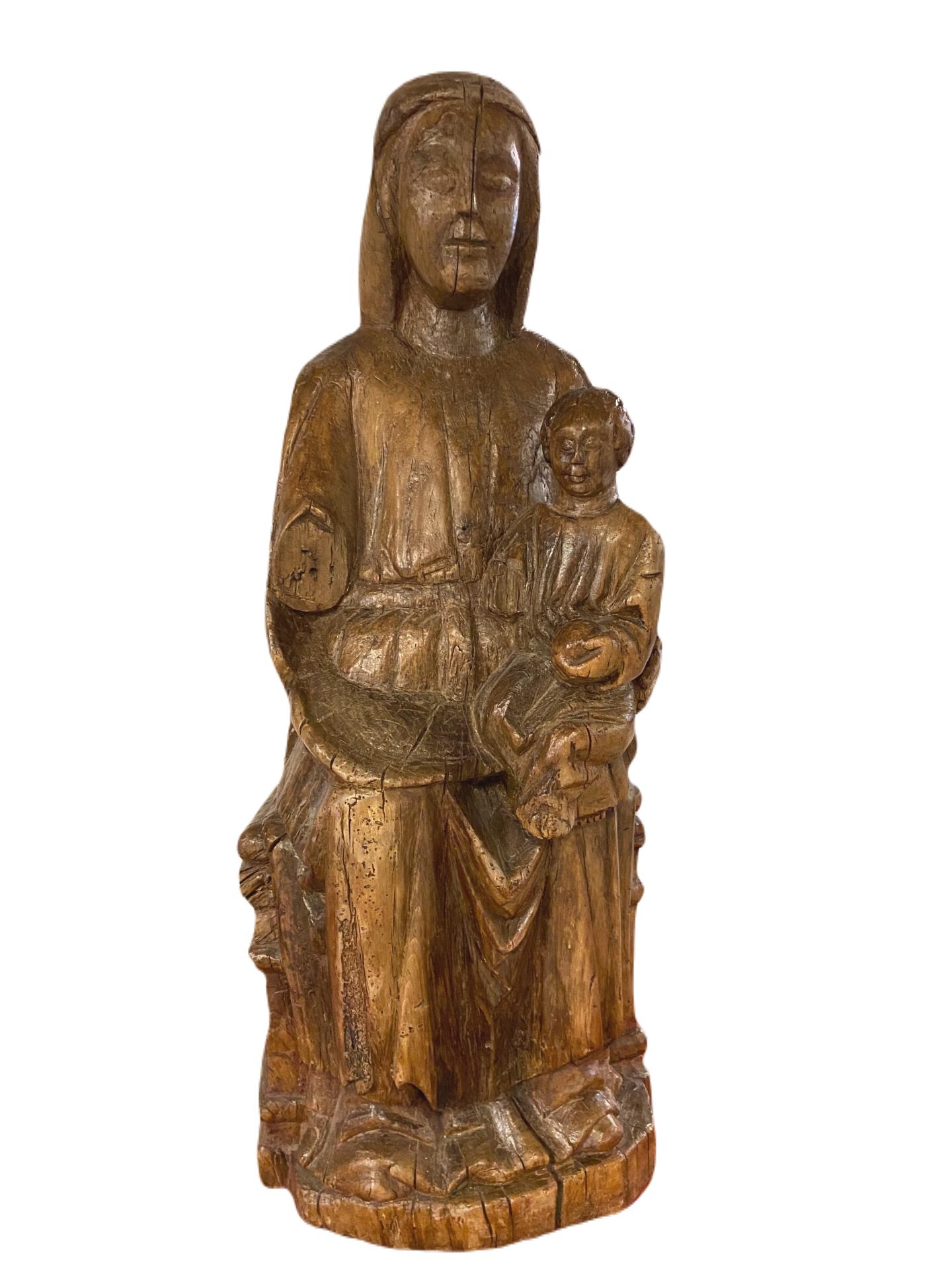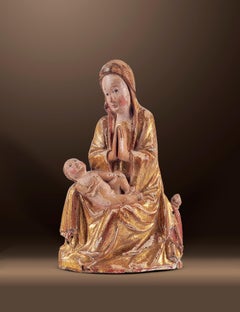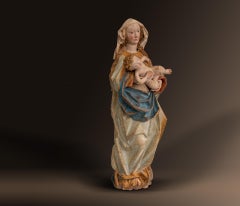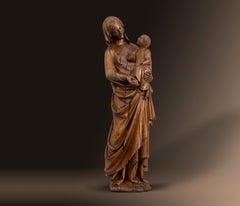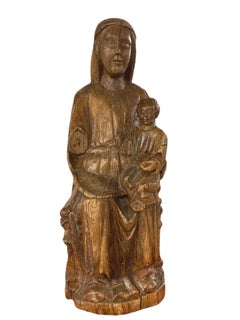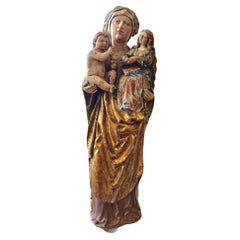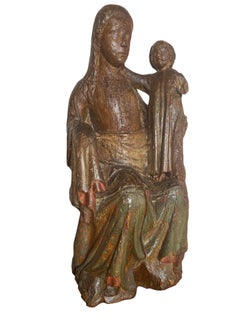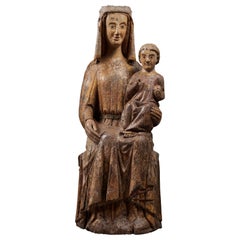Want more images or videos?
Request additional images or videos from the seller
1 of 14
CRESCENT MOON MADONNA1480
1480
$168,000
£126,488.53
€146,962.79
CA$236,546.20
A$263,529.40
CHF 138,251.36
MX$3,218,740.73
NOK 1,750,525.85
SEK 1,640,387.47
DKK 1,096,959.33
About the Item
Master in the circle of Michael Pacher
(Mühlen ca. 1435 - 1498 Salzburg)
Salzburg
Around 1480
Carved limewood
Old polychrome version
Height 118 cm
This Madonna is an outstanding example of the unmistakable late Gothic style. Salzburg in particular was known for its artistic sculptures and continued to develop the flourishing tradition of religious sculpture in a significant manner during this period.
Mary stands in an upright and majestic posture, presenting the infant Jesus in her right arm. She is not holding Jesus directly, but with a cloth; a gesture that emphasizes his divinity. This indirect touch also reflects the reverence that medieval artists and viewers had for the holy child. Mary wears a crown with Gothic tracery carvings that emphasize her status as Queen of Heaven. Beneath the crown, her long hair falls gracefully in waves to her waist, emphasizing her femininity and her virginal, timeless beauty. She wears a flowing, belted dress covered by a drape. The luxurious outside of the cloak is gilded and symbolizes divine light, while the inside – originally silver, now oxidized – once stood for purity. Together, these colors reflect Mary’s dual role as caring mother and royal figure of the heavenly realm.
The crescent moon
A defining element of this sculpture is the crescent moon under Mary’s feet, a highly symbolic sign that is closely associated with Marian iconography and apocalyptic visions. The face in the crescent moon refers to the Book of Revelation (12:1): “And there appeared a great sign in heaven: a woman clothed with the sun, and the moon under her feet, and on her head a crown of twelve stars.” This associates Mary with the woman of the Apocalypse, a figure of victory over darkness. Such depictions were of particular importance to the medieval public, who saw Mary not only as a loving mother, but also as a powerful advocate in the cosmic battle between good and evil. According to folklore, the face on the moon may also have a secular level of meaning, possibly capturing the likeness of the carver or a person in his workshop, thus immortalizing the creator in an otherwise divine context.
The Christ child and his mother
The Christ Child sits playfully in Mary’s right hand, his little legs crossed cheekily. His arms are outstretched: In one hand he holds an apple, identifying Christ as the new Adam, while the other hand is probably raised in a gesture of speaking or blessing, emphasizing his divine wisdom even in infancy. His face is framed by the typical Gothic curls which, together with his mischievous smile, give him a lively expression. This naturalism reflects the late Gothic ambition to lend religious figures human warmth without diminishing their divine essence.
Mary’s face embodies the Gothic ideal of feminine beauty. She has a high forehead – a feature enhanced by the fashion of the time, in which the hairline was often combed back – almond-shaped eyes under delicate, curved brows, a narrow nose and a small, closed mouth with youthful red cheeks. These features create a sense of timeless beauty and emphasize Mary’s role as a figure of purity and maternal grace.
The drapery
The drapery of Mary’s clothing is particularly elaborate and contributes to the dynamic overall effect of the composition. The inside of the cloak is visible around Mary’s waist, where the cloak forms large, voluminous bowl pleats that add depth and movement to the figure. Mary gathers part of her cloak near the center of her body, creating a cascade of complex folds and creases that convey a lively energy. At the same time, the masterful carving techniques characteristic of the period are emphasized. The underlying dress falls diagonally, drawing the viewer’s eye to her right foot, which rests directly on the crescent moon symbolizing Mary’s victory over sin and death.
Pacher’s environment
Due to the popularity of the subject towards the end of the 15th century, several comparable sculptures of crescent moon Madonnas exist. Interesting here, however, is the detail of the borders meeting in front of the middle of the body, which bear a resemblance to works by Friedrich Pacher (Neustift 1435 – ca. 1508 Bruneck). For example in the “Mercy Seat between St. Mark and St. Anthony Eremita” from around 1480/90 (Belvedere Vienna, State Stables, inv. no. 4880), where the cloak of St. Mark in particular is brought together in front of the body. In the sculpture presented here, this is done more realistically, as Mary gathers the cloak with her hand. It is very likely that Friedrich Pacher was related to the important sculptor Michael Pacher and worked with him until around 1481. It is therefore possible that the master carver of this figure came from Michael’s circle, meaning that he was also familiar with Frederick’s sculptures and borrowed from them.
This Madonna reflects the unmistakable artistry of the late Gothic sculptors, who combined devotional symbolism with idealized beauty and detailed design. Mary is depicted not only as the gentle mother of Christ, but also as a majestic queen and apocalyptic victor, standing triumphantly on the crescent moon – a figure of both heavenly grace and human warmth.
Literature
Alexander von Hohenbühel, “Zur Frage der Verwandtschaft von Michael und Friedrich Pacher”, in: Der Schlern, vol. 92 (2022), issue 3, pp. 36-38.
Nicolò Rasmo, Michael Pacher, Munich 1969.
Südtiroler-Kulturinstitut-Kulturservice (ed.), Michael Pacher and his circle. A Tyrolean artist of the European late Gothic period 1498-1998, Bolzano 1998.
- Creation Year:1480
- Dimensions:Height: 46.46 in (118 cm)Width: 11.82 in (30 cm)
- Medium:
- Movement & Style:
- Circle Of:Michael Pacher (1435 - 1498, Austrian)
- Period:
- Condition:
- Gallery Location:Wien, AT
- Reference Number:1stDibs: LU1143216293142
About the Seller
No Reviews Yet
Vetted Professional Seller
Every seller passes strict standards for authenticity and reliability
Established in 1986
1stDibs seller since 2019
- ShippingRetrieving quote...Shipping from: Wien, Austria
- Return Policy
Authenticity Guarantee
In the unlikely event there’s an issue with an item’s authenticity, contact us within 1 year for a full refund. DetailsMoney-Back Guarantee
If your item is not as described, is damaged in transit, or does not arrive, contact us within 7 days for a full refund. Details24-Hour Cancellation
You have a 24-hour grace period in which to reconsider your purchase, with no questions asked.Vetted Professional Sellers
Our world-class sellers must adhere to strict standards for service and quality, maintaining the integrity of our listings.Price-Match Guarantee
If you find that a seller listed the same item for a lower price elsewhere, we’ll match it.Trusted Global Delivery
Our best-in-class carrier network provides specialized shipping options worldwide, including custom delivery.More From This Seller
View AllSitting Madonna
Located in Wien, Wien
Sitting Madonna
Central Italy/Tuscany or Marche
Around 1420
Poplar wood carved
Original version
Height 31 cm
Charming Madonna sculpture from the heyday of the Soft or International...
Category
15th Century and Earlier Gothic Figurative Sculptures
Materials
Wood
Madonna
Located in Wien, Wien
MUSEUM SCULPTURE
Master workshop
Hans Klocker
before 1474, possibly in Gais -
After 1500
"CRESCENT MOON"
Around 1480/90
Stone pine wood carved
Original version
Height 77 cm
This ext...
Category
15th Century and Earlier Figurative Sculptures
Materials
Wood
Price Upon Request
Madonna
Located in Wien, Wien
MADONNA
Il DE FRANCE/PARIS
Around 1270
Oak wood carved
Height 79cm
Category
15th Century and Earlier Figurative Sculptures
Materials
Oak
Price Upon Request
Virgin and Child
Located in Wien, Wien
OUTSTANDING MADONNA
Bavaria
Around 1515/20
Lime wood carved
Original, polychrome version
Height 60 cm
This masterfully carved, full-round Madonna was created around 1515-20 in...
Category
16th Century Medieval Figurative Sculptures
Materials
Wood
Romanesque Madonna - 1175/80
Located in Wien, Wien
ROMAN MADONNA
“Sedes Sapientiae”
Auvergne
Around 1175/80
Pine wood
Polychrome remains
Height 40 cm
This depiction of the Madonna is a masterfully carved, extremely early figure made...
Category
15th Century and Earlier Gothic Figurative Sculptures
Materials
Wood
Sedes Sapientiae
Located in Wien, Wien
Sedes Sapientiae
Pustertal um 1220/30
Weichholz/Lindenholz(?)geschnitzt
Reste von originaler Polychromie
Höhe 57 cm
Category
15th Century and Earlier Figurative Sculptures
Materials
Wood
You May Also Like
Enthroned Madonna and Child.
Located in PARIS, FR
Large Virgin and Child in carved wood, carved back. Sitting on a throne bench, Mary carries Christ seated on her left knee. The Virgin has a face with stylized features with semicircular eyebrow arches, almond-shaped eyes with protruding eyeballs. Marie is wearing a belted dress with a simple neckline and a coat with a flap that goes back to the front. Tiny traces of polychromy.
Romanesque influences are still present. With her protruding eyes, she can also be compared to the statuary of Lake Constance. Our Virgin, rare for its size, nevertheless presents strong analogies with the Italian Sedes Sapientiae...
Category
15th Century and Earlier Medieval Figurative Sculptures
Materials
Wood
15th Century Gothic Virgin
Located in Madrid, ES
15th century Gothic Virgin
Gothic Virgin of the 15th century Virgin in carved and polychrome wood of the 15th century. In its original state, muse...
Category
Antique 15th Century and Earlier Figurative Sculptures
Materials
Wood
$20,890
Vierge en majesté mosane. Sedes Sapientiae.
Located in PARIS, FR
Grande Vierge à l'Enfant en chêne de la fin du 13ème siècle ou début du 14ème siècle. La plastique des visages et du Christ évoque le 13ème siècle (le visage de la Vierge évoque le visage de la Sedes Sapientiae...
Category
15th Century and Earlier Gothic Figurative Sculptures
Materials
Wood
Important Virgin and Child in Majesty
Located in Saint-Ouen, FR
Important virgin and child in majesty
Origin : Germany Or Eastern France
Époque : Second Half Of The 13th Century
Height: 104.5 cm
Length: 3...
Category
Antique 15th Century and Earlier Figurative Sculptures
Materials
Oak
Early Renaissance Wood Sculpture
Located in Los Angeles, CA
An evocative, 14th century, carved wood statue of a seated Mary with the Christ child in her lap. The piece with a beautiful patina featuring polychrome paint traces. Now mounted on ...
Category
15th Century and Earlier Renaissance Figurative Sculptures
Materials
Paint, Wood
Rare Nursing Virgin from the 14th century
Located in Saint-Ouen, FR
RARE NURSING VIRGIN FROM THE 14TH CENTURY
ORIGIN : ITALY
PERIOD : 14TH CENTURY
Height : 60 cm
Width : 20,5 cm
Depth : 11 cm
Wood
Seated and in a very maternal position, Mary is wearing a red dress with a long, flowing cloak covering her narrow shoulders and falling down her body, with one side hugging her bust.
Her hair, half hidden under a veil, frames an oval face featuring a high forehead, a long and thin nose, a small mouth with thin lips and half-closed eyes.
Mary is carrying her son, the infant Jesus, who is wrapped in a cloak, in her lap. Jesus is being nursed by his mother, held by her left hand.
This remarkable depiction, imbued with such gentleness, is directly inspired by the iconographic theme of the Virgin and Child in Majesty. It breaks with the hieratic, impassive style of the models from the 12th and 13th centuries, adding a touch of realism. From Virgin Queen, Mary became Virgin Mother.
Linked to the development of the Marian cult, this type of representation, sometimes known as Virgo lactans, Virgin of Milk or Nurturing Virgin, remains extremely rare. This image of the Virgin Mary and the Infant Jesus is an extremely delicate representation of the intimate bond formed...
Category
Antique 15th Century and Earlier Italian Gothic Figurative Sculptures
Materials
Wood
More Ways To Browse
Crescent Moon
Antique Wood Saw
Medieval Head
Antique Jesus Sculpture
Jesus Wood Sculpture
15th Century Gothic
Medieval Cross
Jesus Christ Sculpture
Antique Wood Book Stand
Gothic Wood Sculpture
Gothic Wood Carving
Antique Wood Hand Saws
Large Carved Wood Bear
Very Large Bowl Wood
3 Feet Bowl
15th Century Wood Carving
Sun Moon Stars
Jesus Child Sculpture
